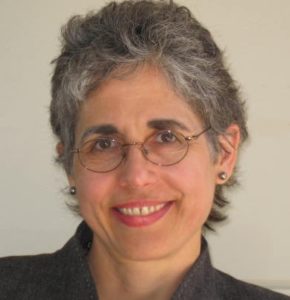Meet Susan Salkind
Compiled by Monica Bay
Susan Salkind is our new Residential Fellow; she joined us this Spring. On her CodeX biography, she explains that she “works at the intersection of innovation and regulation to help diverse collaborators spur adoption of best-in-class technology and delivery models to improve the quality, efficiency and accessibility of the legal system.”
“She is recognized for her visionary approach to moving legal and risk management service delivery up the maturity curve—and engaging leadership of trusted practitioner communities with emerging models such as market-networks.”
Salkind’s interests “include defining Quality of Services (QoS) standards for computational law technologies as they are developed, deployed and scaled within the Internet of Things/Smart Cities global buildout—and the mainstreaming of computational-based legal service delivery systems to improve citizen access and engagement.”

FOUR QUESTIONS
Q. Tell us about your career and what brought you to CodeX
A. I’ve worked most of my career in and around professional associations—of educators, bankers, doctors and, most recently, lawyers. I have a related passion in mentoring professionals in transition, and have helped Silicon Valley engineers retool their careers as a consultant. All that has led to a fascination with the future of professions and sustainable ways of working and delivering services.
Post recession, I was at The Bar Association of San Francisco trying to figure out, like everyone else, where this was all heading. The coverage of CodeX was something like a beacon, and I’ve been following that ever since.
Q. What will you be focusing on as our Residential Fellow?
A. My personal vision for CodeX is to see it mature not only as a leader within the legal industry, but also in key domains within technology and engineering. I’ll be contributing broadly across partnerships, programs, process and operations, and serve as an ambassador for CodeX within and outside the Stanford community.
Q. What do you see as the biggest challenges and opportunities for the legal industry?
A. A big challenge is breaking outside the echo chamber—the debate-resist cycle—to collaborate with industries that are further along the maturity curve. While we, as an industry, wrestle with important but often intractable issues, in some respects the world has moved on without us. People make decisions about everything—from their daily lives as individuals to the technology products and services they develop that, in turn, increasingly affect every aspect of those daily lives. The legal profession and its essential societal role has an opportunity to leverage the massive technological transformation under way (platforms, IoT buildout, etc.) to embed itself more fully and more functionally into how we work and live.
Q. How did your experience in Washington D.C. shape your perspectives and career?
A. Living in one of the great global capitals, you come to appreciate that the place belongs not just to the nation, but to the world. I lived overseas as a child, and my time in D.C.—and travels on the eastern seaboard and abroad—re-kindled a connection to a broader community that has informed my work since.
Compiled by Monica Bay, CodeX Fellow.
Cover image: Clipart.com
